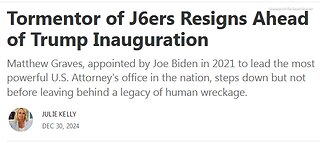Premium Only Content

JEFF MCKELLOP INTEVIEW>59 YO>J-6 POW>FMR ARMY RANGER>SPCL FORCES 10 YRS & INDIE CONTRACTOR FOR GOV'T SAME WORK AS J-6 - 10 mins.
COWBOY LOGIC-9-11-2024-JEFFREY MCKELLOP INTEVIEW - BORN 1965 59 YEARS 0OLD - J-6 POW IN JAIL - FORMER ARMY RANGER - SPECIAL FORCES 10 YRS AND INDEPENDENT GOVT CONTRACOR - DID SAME WORK AS ON J-6 -"JESUS CHRIST PEOPLE GET INVOLVED" - 10 mins. COWBOY LOG C-9-11 -2024-JEFFREY MCKELLOP-INTERVIEW - BORN 1965 59 Y0-J-6 POW JAIL - 9-11-2024.
.
REFERENCE TO PHONE EMERGENCY NUMBER 511 - What Is It? Re: FEDERAL HIGHWAY ADMINISTRATION INFORMATION:
Background: The public and private sectors across the country have invested millions of dollars in Intelligent Transportation Systems (ITS) as a means of enhancing mobility, improving safety, and speeding freight to its destination.
A great deal of information is collected via ITS. Providing access to traffic information via one nationwide, three-digit telephone number is a means to make the most of that investment. That is, to get that information to the driver and shipper by this country's most common means of communication – the telephone.
One easy-to-remember number, regardless of the traveler's location, gives travelers' choices - choice of time, choice of mode of transportation, choice of route – which save lives, time and money.
On March 8, 1999, The U.S. Department of Transportation (USDOT) petitioned the Federal Communications Commission (FCC) to designate a nationwide three-digit telephone number for traveler information. This petition was formally supported by 17 State DOTs, 32 transit operators, and 23 Metropolitan Planning Organizations and local agencies. On July 21, 2000 the Federal Communications Commission designated "511" as the single traffic information telephone number to be made available to states and local jurisdictions across the country.
The FCC ruling leaves nearly all implementation issues and schedules to state and local agencies and telecommunications carriers. There are no Federal requirements and no mandated way to pay for 511; however, USDOT and FCC expect to see some type of nationwide deployment. In 2005, the FCC will review progress in implementing 511.
While the flexibility provided in the FCC ruling is highly desirable, it also presents a challenge. There is a great deal of interest in using 511 throughout the U.S. It is expected that there will be multiple requests for 511, at least in some parts of the U.S., from DOTs, transit agencies, regional and local transportation agencies, as well as private service providers who will offer to implement 511 services for some sort of compensation. If not thoughtfully planned, 511 services could devolve into an inconsistent set of services widely varying in type, quality and cost.
Summary/Key Points
Transportation community asked for 511
FCC assigned 511 with few strings attached
State and local agencies responsible for implementation
FCC encourages national use and consistency of service
FCC will review our progress in 5 years.
.
-
 4:00
4:00
LEARN FROM HISTORY OR DOOMED TO REPEAT IT
15 days agoTEXT ARTICLE ONLY READ BELOW - Tormentor of J6ers Resigns Ahead of Trump Inauguration - 4 mins.
35 -
 DVR
DVR
Flyover Conservatives
22 hours agoAMANDA GRACE | Prophetic Warnings Ignored: What Happens When Leaders Defy God | FOC Show
19.4K8 -
 59:57
59:57
The StoneZONE with Roger Stone
5 hours agoMEDICAL MURDER: A Sneak Peak into the Making of Died Suddenly 2 | The StoneZONE w/ Roger Stone
22.7K5 -
 1:07:03
1:07:03
Tucker Carlson
5 hours agoMother of Likely Murdered OpenAI Whistleblower Reveals All, Calls for Investigation of Sam Altman
107K104 -
 55:44
55:44
LFA TV
11 hours agoCongress Humiliates Itself | TRUMPET DAILY 1.15.25 7pm
68.2K13 -
 1:42:04
1:42:04
2 MIKES LIVE
6 hours ago2 MIKES LIVE #167 News Breakdown Wednesday!
43.8K14 -
 2:12:19
2:12:19
Quite Frankly
9 hours ago"Fahrenheit 2025: Drone Hysteria, The Fog, Smart L.A." ft. Elana Freeland 1/15/25
61.3K11 -
 1:43:00
1:43:00
Redacted News
8 hours agoBREAKING! CAPITOL POLICE ON HIGH ALERT OVER ATTEMPTS AGAINST TRUMP, MEDIA SILENT | Redacted
167K322 -
 51:09
51:09
Candace Show Podcast
7 hours agoHILARIOUS! TikTok Ban Backfires | Candace Ep 133
129K181 -
 9:42:20
9:42:20
Dr Disrespect
11 hours ago🔴LIVE - DR DISRESPECT - WARZONE - NO MERCY
132K35